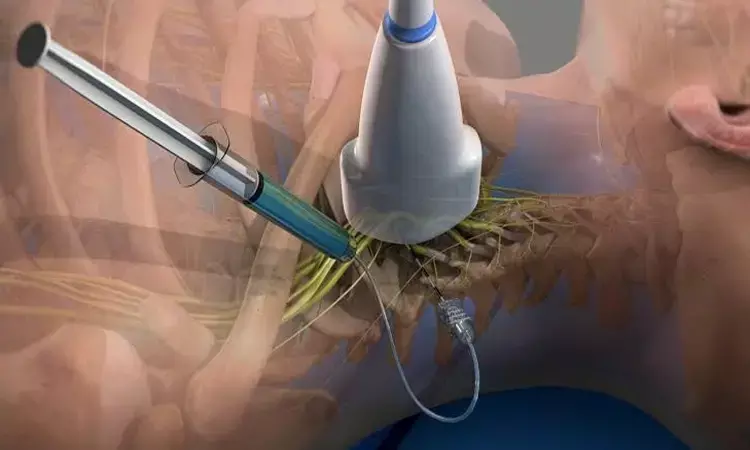- Home
- Medical news & Guidelines
- Anesthesiology
- Cardiology and CTVS
- Critical Care
- Dentistry
- Dermatology
- Diabetes and Endocrinology
- ENT
- Gastroenterology
- Medicine
- Nephrology
- Neurology
- Obstretics-Gynaecology
- Oncology
- Ophthalmology
- Orthopaedics
- Pediatrics-Neonatology
- Psychiatry
- Pulmonology
- Radiology
- Surgery
- Urology
- Laboratory Medicine
- Diet
- Nursing
- Paramedical
- Physiotherapy
- Health news
- Fact Check
- Bone Health Fact Check
- Brain Health Fact Check
- Cancer Related Fact Check
- Child Care Fact Check
- Dental and oral health fact check
- Diabetes and metabolic health fact check
- Diet and Nutrition Fact Check
- Eye and ENT Care Fact Check
- Fitness fact check
- Gut health fact check
- Heart health fact check
- Kidney health fact check
- Medical education fact check
- Men's health fact check
- Respiratory fact check
- Skin and hair care fact check
- Vaccine and Immunization fact check
- Women's health fact check
- AYUSH
- State News
- Andaman and Nicobar Islands
- Andhra Pradesh
- Arunachal Pradesh
- Assam
- Bihar
- Chandigarh
- Chattisgarh
- Dadra and Nagar Haveli
- Daman and Diu
- Delhi
- Goa
- Gujarat
- Haryana
- Himachal Pradesh
- Jammu & Kashmir
- Jharkhand
- Karnataka
- Kerala
- Ladakh
- Lakshadweep
- Madhya Pradesh
- Maharashtra
- Manipur
- Meghalaya
- Mizoram
- Nagaland
- Odisha
- Puducherry
- Punjab
- Rajasthan
- Sikkim
- Tamil Nadu
- Telangana
- Tripura
- Uttar Pradesh
- Uttrakhand
- West Bengal
- Medical Education
- Industry
Shoulder block safer, more effective than interscalene block for arthroscopic shoulder surgeries

Arthroscopic orthopedic surgery can cause a lot of pain and discomfort after the procedure. Interscalene block (ISB) has been linked to side effects such as phrenic nerve palsy. Shoulder block (ShB) is a relatively new diaphragm-sparing analgesic option in these situations.
A recent study published in the Indian Journal of Anesthesia by the AIIMS team found out that shoulder block can be preferred over interscalene block for arthroscopic surgeries.
This study included a total of 70 adult patients undergoing arthroscopic Bankart repair surgery. Patients were grouped into Group ISB who received 0.5 percent bupivacaine 10 ml and Group ShB who received 0.5 percent bupivacaine (suprascapular block 10 ml and axillary block 10 ml)] using Ultrasound and a nerve stimulator.
Key findings included are:
The results show that arthroscopic Bankart repair using a single shot dual guidance ShB is a safe and successful procedure which produced equivalent analgesic consumption and patient satisfaction as ISB, with less motor block and fewer side effects.
ShB group had partial motor blockade in 100 percent of cases, whereas ISB patients had total motor block in 88.6% of cases because ISB paralyses the entire upper limb.
The posterior rotator cuff muscles and the deltoid were affected by ShB. So, the incidence of postoperative paresthesia and motor impairment was substantially greater in the ISB group.
The initial analgesic need in ISB group was substantially delayed (8.2 h vs. 4.6 h), while in the ShB group 4 h Visual Analogue Source (VAS) was much greater. VAS in ISB group was significantly greater at 12 hours.
In the ISB group, dyspnea was observed in a patient (2.9%) and ptosis was noticed in two patients (5.7%), whereas no problems were detected in the ShB group. The two groups' satisfaction levels at 24 hours were comparable, and none of them reported a low degree of satisfaction.
In conclusion the lead, Dr. Saini said "ShB and ISB have similar efficacy in terms of VAS in recovery, cumulative analgesic requirement, and patient satisfaction. ISB prolonged the time to first analgesic request but resulted in significantly higher delayed rebound pain. Considering the undesirable effects associated with ISB like phrenic nerve blockade, prolonged upper limb weakness and the occurrence of rebound pain, ShB may be preferred for arthroscopic shoulder surgeries."
Source
Saini S, Rao SM, Agrawal N, Gupta A. Comparison of analgesic efficacy of shoulder block versus interscalene block for postoperative analgesia in arthroscopic shoulder surgeries: A randomised trial. Indian J Anaesth 2021;65:451-7
Medical Dialogues consists of a team of passionate medical/scientific writers, led by doctors and healthcare researchers. Our team efforts to bring you updated and timely news about the important happenings of the medical and healthcare sector. Our editorial team can be reached at editorial@medicaldialogues.in.
Dr Kamal Kant Kohli-MBBS, DTCD- a chest specialist with more than 30 years of practice and a flair for writing clinical articles, Dr Kamal Kant Kohli joined Medical Dialogues as a Chief Editor of Medical News. Besides writing articles, as an editor, he proofreads and verifies all the medical content published on Medical Dialogues including those coming from journals, studies,medical conferences,guidelines etc. Email: drkohli@medicaldialogues.in. Contact no. 011-43720751


